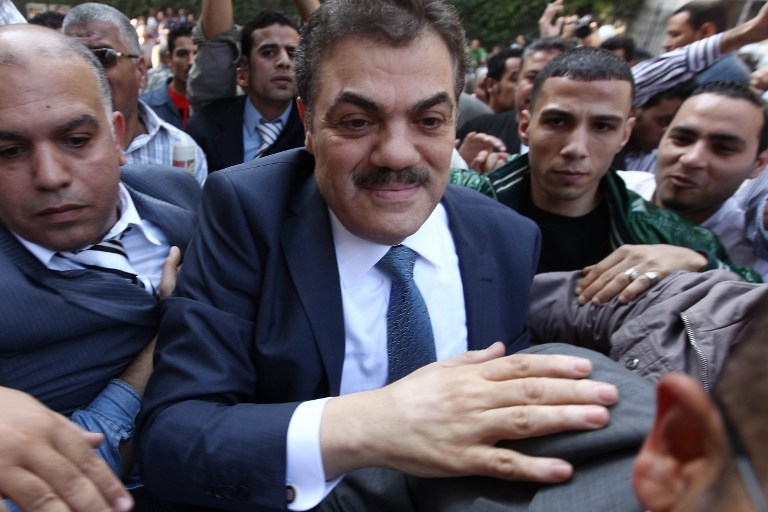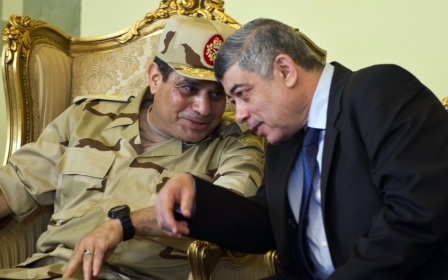Egyptian politician lashes out at military in leaked tapes

A stalwart of the Egyptian military-rooted government, the head of Egypt’s Wafd opposition party Sayed Badawi, has been unveiled as a scheming political figure in a series of discrediting leaked audio tapes over the past couple of days.
The leaks, which were uncovered by television presenter Abdul Rahim Ali on his talk show ‘The Black Box’ on Monday and Tuesday, revealed that the crackdown on the Muslim Brotherhood since the 2013 military coup had been planned by state security services several years ago.
In an audio tape, allegedly recorded just ahead of the 2012 presidential elections which saw the Muslim Brotherhood’s Mohamed Morsi come to power, Badawi was heard in dialogue with an unidentified person thought to be a member of the security services, reported Arabi21.
As Badawi tells his counterpart that he is looking to run for president and needs the support of the Muslim Brotherhood and Salafists to win the elections, his counterpart responds: “The Brotherhood will witness their worst days in the coming period.”
“Militias will go out and slaughter them in their homes. Anyone who speaks out will be slaughtered in their bed. Terrorism will become rampant across Egypt. We will take revenge from the Brotherhood and anyone who took part in a revolution to topple the state,” his counterpart goes on to say.
Not only do the tapes address Egypt’s political opposition, the leaks also show Badawi lashing out at his political opponents, using the media as a tool to discredit or lobby them.
Badawi agrees to a suggestion by Mohamed Abdel Mutaal, head of al-Hayat satellite network - which Badawi owns - to lobby Egyptian Coptic businessman Naguib Sawiras by inviting him to participate in televised discussion about Egypt’s political divisions, an audio tape reveals.
Sawiris, an Egyptian business tycoon listed by Forbes Magazine as one of Egypt’s richest men, also plays an influential political role as board member of the liberal Free Egyptians Party founded in 2011.
Yet in another leak, Badawi bad-mouths Sawiris for having been invited to participate in a national dialogue initiative while his Wafd party is not.
“How dare they invite everyone and not us? Those dogs… may they be damned,” Badawi is recorded as saying referring to SCAF.
Badawi speaks contemptuously of the SCAF - which lead Egypt for 18 months after the 2011 uprisings – for not inviting the Wafd party to participate in the national dialogue.
The Wafd is one of Egypt's oldest political groups established as a nationalist party in 1930s. Along with other tame opposition parties working under Mubarak, the Wafd party was seen as a co-opted counterpart of the state.
In the audio tape, Badawi goes on to speak over the phone with a third person saying: “They should have started by inviting the Wafd party, not the Brotherhood, Naguib Sawaris and Amr Moussa.”
“Who is this Naguib Sawiris anyway? What political role does he play at all?” he asks.
Although the person behind the leaks is unknown, Abdul Rahim Ali, the journalist on whose programme the leaks were unveiled earlier this week, has been widely linked with state intelligence agencies, reported Arabi21.
It is widely suspected that the leaks are part of a wider government plan to do without the former stalwart of the military government.
Over the past few days, Badawi has received sharp criticism from within his party, by a group of members calling themselves the reform wing, who have launched a fierce campaign to discredit Badawi and oust him from his position as head of the political group. The group has planned a demonstration on Friday in front of the party’s headquarters to call for the removal of Badawi from his position.
Furthermore, the prosecutor general has received several requests to investigate accusations against Badawi for embezzling funds and using his partners’ shares in one company to fund a drug company of his own.
Middle East Eye propose une couverture et une analyse indépendantes et incomparables du Moyen-Orient, de l’Afrique du Nord et d’autres régions du monde. Pour en savoir plus sur la reprise de ce contenu et les frais qui s’appliquent, veuillez remplir ce formulaire [en anglais]. Pour en savoir plus sur MEE, cliquez ici [en anglais].




